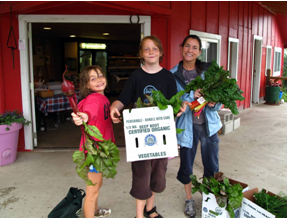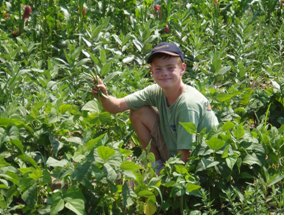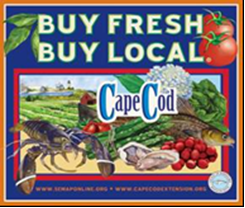
CSA: Investing in Your Community
by Katie O’Sullivan
CSA stands for “Community Supported Agriculture,” a concept that’s been catching on in the U.S. for the last twenty years and has recently arrived on Cape Cod.
What does it mean? A CSA is a pre-paid share of a farm’s produce for the season. In essence, the consumer is “sharing” the farmer’s risk and being rewarded with the farm’s bounty of fresh, local produce and products.
Farms sell a certain number of “shares” in the spring, which helps the farmer’s cash flow. Shareholders start receiving their weekly boxes of local, seasonal produce throughout the farming season.
The advantages for the farmers are easy to see. They get to “market” their food early in the year, before their long days out in the fields even begin.
Getting payments early in the spring helps their cash flow and budget planning. They also have an opportunity to make connections with the people who are eating the food they grow, which in turn makes the farmers feel more invested in their work.
Local farmer Victoria Worthington, of Seaweed and Codfish Herb Farm, insists that “CSAs are more important than just food. It’s about rebuilding our communities,” letting people know there’s a “little bit of old-fashioned community left in their town.”
Shareholders get to eat ultra-fresh, local food every week and connect more closely with what they are eating. Knowing who grows your vegetables and actually seeing produce on the farm can make all the difference to picky kids!

CSA seems like a simple idea, but the impact has been profound around the country, making a difference for both families and farmers.
According to the LocalHarvest.org website, tens of thousands of U.S. families belong to CSAs, and in some parts of the country there is more demand than there are CSA farms to fill it.
Some groups in Connecticut, for example, have made arrangements with farms in Vermont to fill CSA orders that the local farms can’t handle.
The government does not track CSAs so there is no official count of how many exist. The U.S. Department of Agriculture does have pages of information about CSAs, and a long list of publications to help farmers develop and use a CSA business model.
LocalHarvest.org claims to have the most comprehensive directory of CSA farms, with over 2,500 listed so far.
CSAs aren't confined to produce. Some farmers include the option for shareholders to buy shares of eggs, homemade bread, meat, cheese, fruit, flowers, honey, or other farm products along with their veggies.

Martha’s Vineyard Fiber Farm in Edgartown is the first farm in the nation to offer a yarn-only CSA! Off-Cape in Gloucester, fishermen recently had success with a shrimp CSA, a model which the Chatham fishermen have been looking at with interest.
Who came up with the CSA idea? According to Wikipedia, the concept was developed in the 1960s in both Europe and Japan by people concerned about food safety and the urbanization of agricultural land. The idea arrived in the U.S. in the early 1980s, with the first official CSA setting up in New Hampshire.
Here on Cape Cod there are several CSAs accepting new members. At Cape Cod Organic Farm in Barnstable, the CSA program is in its second year and managed by Mary Blair Petiet. Shares are sold between February and May, and last year they sold all 150.
According to Mary Blair, the CSA “offers a great alternative way to buy produce that ensures good land stewardship, keeps your dollars local and puts healthy food on your plate. Our volunteer program also helps shorten the distance from farm to plate by putting participants out on the land.”
Veronica Worthington has been using the CSA model for the last five years at her organic Seaweed and Codfish Herb Farm in West Dennis. For the first few years, she offered more of a “salad club,” describing it as “everything you’d want for the most perfect salad.” This was before the CSA model had even reached Cape Cod.
In her first year, she had an overwhelming response and learned a great deal about running a CSA. “I learned that a little bit of everything just doesn’t cut it. Many customers have unrealistic expectations. They have a vision in their minds of heaping wicker baskets, with veggies and greens spilling out of it, and windowsills filled with tomatoes.”
This year, she plans to offer a CSA with four different crops each week, but a lot of each, plus a dozen organic eggs. She sells only full shares at $40 per week (customers can split them on their own) and has already almost sold out for the season.
Farming is a tough business, one where you need patience, fortitude and a sense of humor. Having a CSA helps to validate her reasons for being farmer, Veronica explains.
Getting the money in spring is vital to keeping the ledger in the black, and keeping stress levels manageable. CSAs also help a farmer to plan how much to plant and how many workers to hire.
 |
When she sent out the notice about her 2010 CSA intentions, all of her customers from last year re-signed for the coming summer. “Checks are coming in from California, Pennsylvania, you name it,” she says, sounding pleased.
She adds that the best thing about a CSA is that “a farm running a CSA can actually count their chickens before they hatch.”

Cape Cod & the Islands Farms
offering CSA Shares
- Bay End Farm – Buzzards Bay, Bourne
- Coonamessett Farm – East Falmouth
- Cape Cod Organic Farm – Barnstable
- Hawk’s Wing Farm – Yarmouth
- Seaweed & Codfish Herb Farm – West Dennis
- Eldridge Farm – Brewster/Harwich
- Pleasant Lake Farm – Harwich
- First Lyte Organic Farm – Truro
- Silverbrook Farm – Provincetown CSA at Bradford Market
- Martha’s Vineyard Fiber Farm – Edgartown
- Katama Farm – Edgartown
- Whipporwill Farm – West Tisbury
- Moors End Farm, Nantucket
Find information about these and other local farms at the following websites:*
Local Harvest CSAFarm Fresh CSA
*Off-Cape readers can also visit these websites to find CSAs close to their own homes! Just plug in your local zipcode and find farms and fresh produce in your area!

Katie O’Sullivan is the Editor of this magazine. She lives in Harwich with her husband, three children and two large dogs and a new puppy.
In addition to reporting and editing, she writes contemporary fiction. Her first suspense novel, "Unfolding the Shadows", was released in 2009 from Cerridwen Press. Visit Katie at her web site or check out her blog.